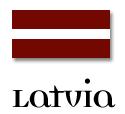Riga riot could damage Latvia's reputation, says central bank boss
 Riga - Latvian central bank governor Ilmars Rimsevics said Thursday the riots that erupted in the capital Riga earlier in the week could have serious economic consequences for the Baltic nation unless care was taken.
Riga - Latvian central bank governor Ilmars Rimsevics said Thursday the riots that erupted in the capital Riga earlier in the week could have serious economic consequences for the Baltic nation unless care was taken.
"At the moment the country needs a government that can deliver on the commitments for solving the crisis that Latvia has made to the European Commission and the International Monetary Fund (IMF).
"The dissolution of parliament would send a negative signal," Rimsevics said at his monthly press briefing, referring to demands for fresh elections made by protestors at Tuesday's rally.
After the rally ended, several hundred youths attacked the Latvian parliament building and fought battles with riot police.
In December, Latvia negotiated a 7.5-billion-euro (10-billion- dollar) international aid package with the help of the IMF, European Union, European Bank of Reconstruction and Development and neighbouring countries to assist its stricken economy.
On Wednesday, Latvian President Valdis Zatlers issued an ultimatum to the government of Ivars Godmanis saying that unless he was convinced by constitutional reform plans by March 31 he would launch a referendum on the dissolution of parliament.
In his briefing, Rimsevics offered a cautious view of his country's economic prospects, pointing to falling inflation and a narrowing current account deficit as reasons why Latvia might meet the strict Maastricht criteria for adoption of the euro as early as 2011.
"By the end of this year inflation in Latvia may come close to the low levels in Western European countries at last. From the inflationary point of view, euro adoption could become possible by 2011 though the actual date for euro adoption will largely depend on the government's ability to meet the Maastricht fiscal requirement by improving the national budget," Rimsevics said.
By the spring, inflation could drop into single digits, Rimsevics said. Average annual inflation for 2009 would be around 6.5 per cent, he predicted.
Also Thursday, after a meeting with leading businessmen, Finance Minister Atis Slakteris said that so far an agreement had been signed with the IMF for 2.2 billion dollars.
On January 20, the EU's Economic and Financial Affairs Council (ECOFIN) meeting in Brussels would take a formal decision on its
4-billion-dollar contribution to the aid package, he said.
"As a direct result of this loan, entrepreneurs will have the opportunity to more fully absorb the European Union's structural funds," Slakteris said. (dpa)